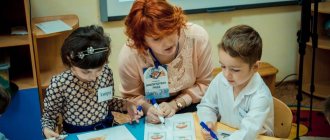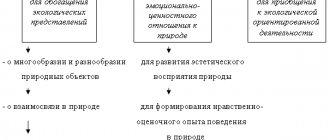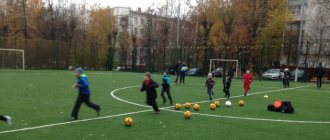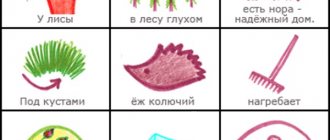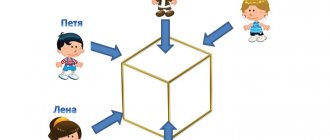A distinctive feature of children is that they perceive any information better in games, since the gaming component increases interest in the process, enhances attention and concentration, and repeated repetitions allow even the most absent-minded kids to absorb knowledge. The competitive moment is very important for born leaders. During the game, a child’s character, peculiarities of imagination and thinking, activity, emotionality, level of social adaptation and a progressive need for contact and communication are revealed.
Didactic games for speech development are a special form of education for preschool children, which allows you to enrich, improve, activate and consolidate vocabulary in the process of play - one of the most important means of harmonious formation and education of a child’s personality.
Depending on the material used, didactic games for speech development are of the following types:
- Games with objects - toys, improvised and natural materials;
- Board games using printed materials;
- Word games.
Speech development through didactic games
The development of speech through didactic games occurs by replenishing vocabulary, teaching in a playful way the skills of using words (activating vocabulary), and improving communication skills.
During the period of preschool preparation, the child needs to master a vocabulary that allows him to communicate without problems with peers and adults, successfully acquire school knowledge, and understand the material presented (the content of literary works, the formulation of mathematical problems, etc.). Therefore, the main task of preschool education is the maximum development of speech, which occurs more effectively and efficiently through didactic games.
Didactic games for speech development successfully solve the following problems in preschool education of children:
- Provide quantitative accumulation of vocabulary necessary for full communication;
- Helps in understanding the meanings of words and their correct use with other words;
- Allows you to master the general meanings of words based on identifying common characteristic features of objects, actions or phenomena;
- Improve figurative thinking and its expression by verbal description, thanks to the use of special speech constructions;
- As cognitive abilities develop, didactic games for speech development help expand the objective conceptual content of words;
- Some games with ethical tasks, along with improving vocabulary, teach the inclinations of social ethics and morality;
- Stimulate the imagination, activating and enriching the preschooler’s vocabulary in an entertaining playful way;
- Develop logical and imaginative thinking necessary to solve assigned game problems;
- They not only help expand your vocabulary, but also actively introduce new words into everyday communication.
The vocabulary of a preschooler is significantly inferior in volume to the vocabulary of an adult. The main task of speech development through didactic games is to quantitatively enrich the child’s vocabulary by increasing the volume of accumulated knowledge about the world around him, to activate and teach him to use it competently.
Didactic games for the development of speech for children from two to three years old
At the age of 2-3 years, the child must master the names of items of clothing, dishes, furniture, toys that surround him in everyday life and arouse his interest. During this period, the names of the actions performed with these objects are also mastered.
The task of educators during this period, with the help of didactic games, is to teach children to name and distinguish:
- Parts of objects, parts of the body of animals and humans;
- Different sizes;
- Primary colors;
- Main taste qualities;
- Some physical qualities and properties.
It is necessary to develop the ability of children to denote in one word a group of similar objects united by a common feature and to distinguish between similar groups of objects.
It’s good at this age to start teaching your child to talk on the phone with an invisible interlocutor. This is a kind of didactic game that develops not only vocabulary, but also abstract thinking, the ability to express one’s thoughts without the help of gestures. You should structure such a conversation correctly, asking simple questions that do not require complex answers; you can make a telephone conversation, for example with your grandmother, a daily ritual.
Didactic games for speech development are also recommended, the essence of which is clear from the name - “Name it correctly...”, “What has changed...”, “What does it consist of...”, etc.
The main goal of such games at this age, while improving vocabulary, is to instill in the child an interest in vocabulary activities.
“Development of speech in children of primary preschool age in play activities”
Author:
Timofeeva Irina Sergeevna,
teacher
MADO kindergarten No. 79 in Tyumen
The relevance of the study is determined by the unique role played by the native language in the formation of the personality of a preschool child. Language and speech have traditionally been considered in psychology, philosophy and pedagogy as a “node” in which various lines of mental development converge - thinking, imagination, memory, emotions. Being the most important means of human communication and knowledge of reality, language serves as the main channel for introducing the values of spiritual culture from generation to generation, as well as a necessary condition for education and training. Preschool age is a period of active acquisition by a child of spoken language, the formation and development of all aspects of speech. The work touches upon the problem of children's speech development in play activities, since in preschool age this type of activity is the leading one. The reason for the urgent need to develop children's speech is the need for a person to communicate with the people around him, and in order for speech to be intelligible, understandable and interesting to others, it is necessary to develop it, it is necessary to conduct a variety of games, to develop methods for conducting games so that children are interested in gaming activities.
Currently, there is a critical situation in the development of speech activity in young children, which is due to a number of negative factors affecting speech function: deterioration in the health of children; a significant narrowing of the volume of “live” communication between parents and children; global decline in the level of speech culture in society. Emotional coldness in the family adversely affects the child’s mental development and communication. The most important prerequisite for improving children's speech activity is the creation of an emotionally favorable situation that promotes the desire to actively participate in verbal communication. And it is play activity that helps create situations in which children’s speech develops.
I work with children of primary preschool age and observe children and their development. Play is the leading activity of a child. The game accompanies the child from birth, remains with him in childhood, adolescence, right up to the transition to adolescence. The game reflects the train of thoughts and feelings of children, leading them along the path of understanding reality.
Thus, I defined for myself the purpose and objectives of the work.
Target:
— speech development of preschool children in play activities. To achieve this goal, I set the following tasks in my work:
— formation of a dictionary; — development of sound culture of speech, coherent speech; - formation of the grammatical structure of speech; - development of speech as a means of communication.
I began my work on this topic by studying methodological literature and the best practices of my colleagues, which helped me build my own concept of speech support for young children through play activities. In my daily work with the children in my group, I definitely use games. The most important prerequisite for improving children's speech activity is the creation of an emotionally favorable situation that promotes the desire to actively participate in verbal communication. And it is play activity that helps create situations in which children’s speech develops. Of great importance for the development of speech is the living environment in which a child is raised, and the attitude of an adult towards him. In the development of speech, the leading role belongs to adults: the teacher in kindergarten, parents and loved ones in the family. The speech culture of adults, how they speak to the child, and how much attention they pay to verbal communication with him, largely determine the success of a preschooler in mastering the language.
Therefore, I consider it relevant to use various types of games for the development of speech in preschool children.
With the help of didactic games I activate children's vocabulary. Each didactic game has its own program content. In this regard, the program content of the game also includes a certain group of words that the child must master. Didactic games are educational games. They are created by adults for the purpose of raising and educating children. For children at play, educational value is realized through a game task, game actions, and rules. In the process of educational activities with children, play acquires special significance: it serves as a means for instilling in children new positive speech skills. So, playing didactic games with toys and objects with kids, such as: “The doll Masha woke up”, “Toy Store”, I help children consolidate their knowledge of the names of clothes, tableware, and activate their speech.
I use board and printed games in my work: “Paired Pictures”, “Loto”, etc. In such games I formulate speech, consolidate children’s knowledge about plants, animals and their babies, vegetables and fruits. With the accumulation of nouns, generalizing concepts (clothing, dishes, furniture) appear in children's dictionaries.
Manipulating with toys during the game, they indicate actions: walking, sleeping, eating, etc., i.e. using verbs. In the games: “More - Less”, “Wonderful Bag”, I teach children to see the features of objects and highlight characteristic features and qualities, reinforce children’s knowledge about color and size, and enrich their vocabulary with adjectives.
I regularly encourage children to create cut-out pictures and cubes. In this type of game, I solve a problem - I form in children the ability to think logically, and develop their ability to compose a whole object from individual parts. But before giving the task of putting together a picture from its parts, I let the children look at the whole picture. When working with children, I think the combination of visuals and words is effective. Bright objects and pictures make the baby want to look at them. Exploring the world around him, the child learns verbal designations of objects and phenomena of reality, their properties, connections and relationships. To expand, enrich and activate the vocabulary, I use didactic exercises: “Wonderful bag”, “Guess what it sounds like”. These exercises are varied and involve the use of words belonging to different parts of speech. I also enrich children’s vocabulary in didactic games: “Guess and name”, “Guess who came to us”, “Who is doing what”, “Name the animals and tell me who screams what”.
Creating an emotionally favorable situation contributes to the desire to actively participate in verbal communication. And it is theatrical play that helps create situations in which even the most uncommunicative and constrained children enter into dialogue and open up. Theater for a child is always a holiday, a bright, unforgettable experience. After all, theatrical activities are the most common type of children's creativity. Why theatrical activities? Theatrical activities are one of the most effective ways to influence children, in which the principle of learning is most fully and clearly demonstrated: learn by playing. Theatrical play has a great influence on the child’s speech development: it stimulates active speech by expanding the vocabulary and improves the articulatory apparatus. The child learns the richness of his native language and its means of expression. Using expressive means and intonations that correspond to the character of the characters and their actions, he tries to speak clearly so that everyone can understand him. In theatrical play, didactic, emotionally rich speech is formed. Children better assimilate the content of the work, the logic and sequence of events, their development and causality. Theatrical games promote the assimilation of elements of verbal communication (facial expressions, gestures, posture, intonation, voice modulation).
In my work on the development of children’s speech in theatrical activities, I use the following methods and techniques: gaming: - use of elements of outdoor play - surprise moments - imitation movements with elements of onomatopoeia - playing out the text - verbal: - repetition of speech material - questions - use of texts with repeating elements - reading works with onomatopoeia - finishing words, phrases - praise - visual: - using illustrations for texts - using toys, puppet theater characters.
To ensure that children’s interest in theatrical games does not fade away, I adhere to certain requirements:
- content and variety of topics - constant inclusion of theatrical games in all forms of the pedagogical process - maximum activity of children at the stages of preparation and conduct of games - cooperation of children with each other and adults at all stages of theatrical activities.
Of a special nature is the game that children create themselves, reproducing in it what is close and interesting to them (the actions of people with household objects, labor processes, people’s attitude towards each other, their recreation, entertainment, etc.). In such games, the theme, content, and sequence of displayed events are not predetermined by adults; they are based on the life experience of children; the rules seem to be hidden in the content of the events displayed. Such games are called creative, plot-based role-playing games. The game develops the ability to replace objects and actions, which ensures the gradual development of elements of more abstract thinking and speech. Favorable prerequisites for the development of abstract thinking and speech are already created in the play of young children in connection with the generalization and complication of play action. The first joint games instill in children a sense of collectivism and friendship. Kids learn to communicate, make requests and proposals to their comrades. With the timely formation of a plot game, children begin to play together, sometimes three, and enter into role-playing interaction. In games such as “Hairdresser”, “At the Doctor’s Appointment”, I introduce children to the names of professions, teach them to take on a role, perform the appropriate actions (cutting, combing their hair, treating, giving injections, etc.).
Initially, the children imitate what I showed them; over time, they begin to independently organize the game, enter into dialogue, and transfer actions from one object to another. During games, I encourage children to name the objects they use and pronounce the actions they perform. There are a lot of games, they can be very different, but active games occupy a special place among them. The comprehensive influence of outdoor games on a child’s development can hardly be overestimated. With skillful guidance from adults, these games can work wonders. Games are often accompanied by poems and songs. The poetic text determines the course of the game, regulates the motor activity of children and their behavior. Kids listen to the words of the text and focus on the content. Poetic syllables set the rhythm of movement. Movements with speech accompaniment cultivate a sense of beauty, the ability to listen to every word of the teacher, and activate attention. When the game is repeated, the kids remember the words and begin to sing along. Movements with pronouncing individual words and onomatopoeia are one of the effective methods for developing motor skills and stimulating the development of auditory perception. When conducting outdoor games with text, I use appropriate attributes (pictures with game characters, I encourage them to repeat the text. I make sure to involve even shy children in the game, who reveal their capabilities in the game, they develop speech, kids learn to communicate with others. In outdoor games for After the child accepts the plot, I characterize the image being depicted and the toys must speak, thus creating a true play situation.
I made a card index of outdoor games with texts.
A developing subject-spatial environment ensures the creative and speech development of children based on play activities. It not only provides play activities, but is also designed to help establish effective communication between children and the teacher and with each other.
There is no doubt that the development of speech in children of any age is one of the priority tasks in training and education. The child’s speech develops constantly in everyday life, in play, in communication and accompanies him in any activity, but in order for learning to take place easily and freely, without strict rules and intrusiveness, the use of games in the pedagogical process will help. In my work, I analyzed the literature on this issue, revealed the role of the influence of play activities on the speech development of young children, studied the mechanism of managing the game and the methodology for conducting direct educational activities, and used various forms of work with parents.
Gaming activities serve to consolidate the knowledge acquired in the classroom and activate the vocabulary. It is a natural state, a need of the child’s body, a means of communication and joint activities of children. Gaming activity creates that positive emotional background against which all mental processes occur most actively. It reveals the individual abilities and personal qualities of the child, allows us to determine the level of his knowledge and ideas, which is necessary for the further effective work of the teacher with each child.
Based on the above, we can conclude that the work done on the development of speech in young children was successful thanks to correctly selected material and systematic, targeted work. The pupils' active vocabulary was replenished, the grammatical structure of their speech improved, and their thinking processes developed. Children began to express their emotions through speech, withdrawn children became more sociable with peers and teachers, and began to better understand other children in the group.
In the future I plan to continue working in this direction. I consider it advisable to replenish the methodological box with new games, manuals, and to specify the material in order to obtain improved results in my work. I plan to refine the material for working with parents (develop consultations, visualization for the group reception).
Literature used, Internet sources:
Photos from the teacher’s archive
“Certificate of publication in the media” Series A No. 0005885
The certificate is attached to the letter.
We invite teachers of preschool education in the Tyumen region, Yamal-Nenets Autonomous Okrug and Khanty-Mansi Autonomous Okrug-Yugra to publish their teaching materials: - Pedagogical experience, original programs, teaching aids, presentations for classes, electronic games; — Personally developed notes and scenarios of educational activities, projects, master classes (including videos), forms of work with families and teachers.
Why is it profitable to publish with us?
1. “Kindergartens of the Tyumen Region” is an officially registered specialized media outlet at the federal level. 2. The activities of the editorial office are supported by the Department of Education and Science of the Tyumen Region 3. We issue a “Certificate of Publication” in the media. 4. The document has a unique number, is entered in the register, has the original seal of the editorial office of the online publication and signature. 5. “Certificate of publication” in the media is sent to the author in both paper and electronic versions.
Details >>>
Sample “Certificate of publication of author’s methodological material in the media.”pdf
Share
Speech development through didactic games at four years old
At four years of age, the child’s vocabulary is further expanded, with a more detailed delving into the details and characteristics of the world around him. This is necessary to enhance differentiated perception and deepen knowledge about the characteristics of objects, their purpose, structure and expand the understanding of qualities and properties. At this age, the baby must learn the basic techniques of orientation in space and time, master the corresponding words (morning, evening, forward, backward, first, then). Didactic games for speech development, recommended for 4-year-old children, should begin with the phrases “What first, what then...”, “When it happens...”, “What has changed...”, “What will happen if...”, “What can be done with... ", "What can you do with...", "More than...Less than...", "One...many..." and the like.
It’s good if the child talks every evening about how he spent the day, what he played and with whom, what he saw and did. By answering parents' leading questions during role-playing games using their favorite toys, the baby will develop faster, expanding his vocabulary and improving his ability to use it.
How can a teacher develop the speech of preschoolers through play?
Content
What speech problems did the teacher have to cope with? What areas of work did the teacher choose? We had to teach children to play again. Playing with children: a “time machine” for parents “Morning circle”: what are your plans for the day? What results have you achieved? What toys for speech development can a teacher recommend?
The development of speech in preschool children occurs during play. In kindergarten, the schedule is overcrowded, and there is less and less time for play. This has a bad effect on the formation of speech competencies. “ In today's kindergartens, the second half of the day is occupied by clubs. If previously children did nothing but play, now they have about an hour a day to play, instead of the required 3-4 hours. As a result, children do not know how to play or communicate. It's gotten to the point where we're teaching kids how to play again.
“says psychologist
Svetlana Bashinova
.
Teacher of preschool educational institution No. 36 in Kineshma in the Ivanovo region Yulia Vladimirovna Vinogradova
, a resident of the “University of Childhood” community, encountered a similar problem in practice.
The teacher spoke about her project “ We play - we develop speech
,” with the help of which she decided to change the current state of affairs in kindergarten.
What speech problems did the teacher have to cope with?
In the process of working with preschoolers, Yulia Vladimirovna noted that children’s speech is poorly developed: “ Everyone can speak, but only a few can speak correctly.”
" At the same time, the Federal State Educational Standard for preschool education assigns speech a leading place in cognitive activity.
The problem could not be ignored, dooming the children to difficulties in further education at school.
Julia formulated a number of speech disorders that had to be dealt with:
● Poor vocabulary
Children do not have enough words to accurately express their thoughts, which causes the formation of barriers in communication with each other and with adults.
● Monosyllabic speech
85% of preschoolers' speech consists of simple sentences. Attempts to correctly construct a common sentence are often unsuccessful.
● Lack of logic of statement
Children are inconsistent in substantiating their statements and conclusions. While telling something, they switch from one thought to another randomly, without adhering to a specific structure.
● Inability to build a dialogue
Preschoolers do not understand how to clearly formulate their question and how best to answer their interlocutor. They do not feel in which speech situation a monosyllabic answer is appropriate and in which a detailed answer.
● Insufficient development of speech culture
Children, for example, have a hard time adjusting the volume of their voice: they either mutter something under their breath or scream. There are also difficulties with intonation and tempo: either the speech is slow, drawn-out, difficult to understand, or, on the contrary, it is too fast to catch the essence.
● "Littering" of speech with slang
At preschool age, children are not yet able to filter the words they hear and apply them according to the situation, or not use them at all. From the TV screen, on the street, or even from their parents, they snatch filler words, non-literary expressions that they use without thinking.
What areas of work did the teacher choose?
Yulia Vladimirovna identified for herself at the initial stage four main areas of work:
➢ Creation of a developing subject-spatial environment in kindergarten.
➢ Returning role-playing games to children’s daily activities.
➢ Improving interaction between parents and children through activities in kindergarten: the “Playing with Children” technology.
➢ Formation of the skill of exchanging opinions and plans, analysis, and logical construction of a story: the “Morning Circle” technology.
The children had to be re-taught how to play.
“I think it’s not that children began to play less,” says Yulia, “the quality and essence of the game have changed. More primitive forms appeared. Increasingly, the game turns into mischief and even hooliganism.”
There are many toys in kindergarten, which themselves suggest a scenario for their use. As a result, children fantasize less. They use familiar plots from their favorite cartoons - “Smeshariki”, “Barboskiny” - repeat what they have already come up with for them.
To return role-playing games to the world of preschoolers, the teacher began to change the subject-play environment of the kindergarten. She offered the children objects that, at first glance, were not suitable for play: “I removed the ready-made equipment and put in boxes, boxes, and disks.”
Having lost their usual tools, the children began to figure out how to use objects in the play corner to make it interesting and use their imagination. The unfamiliarity of the situation provoked independent communication between the children: they had to negotiate with each other and formulate rules in each individual case.
Teachers monitored the children’s communication from the outside and intervened in the situation only when help was needed in solving a problem or a conflict was brewing. Based on the design of the children's game and their ideas, teachers could remind children about the books they had read. The guys, in turn, developed the basis of the plot and came up with continuations of their favorite fairy tales.
Playing with children: a “time machine” for parents
Understanding that children receive the basis for speech development in the family, Yulia Vladimirovna invited her parents to play in the garden. It worked like a “time machine”: adults got a chance to return to childhood, and children saw mom and dad in an unusual role and took responsibility for the course of the game. They used all the power of their persuasion to teach adults to follow the rules. For some families, these hours of communication became a unique experience, because at home they hardly spent time together.
“Morning circle”: what are your plans for the day?
The “Morning Circle” was used by the teacher as one of the ways to organize free communication. The teacher and the children sat in a circle and discussed the future day: what the children planned to do, what to play, what they would like to do. Children offer ideas and openly express their opinions. They felt that they could choose, there was no pressure on them. A sense of mutual respect was fostered, and the ability to convey one’s thoughts to comrades was developed.
Preschoolers talked about the games they had already played: what they liked, what they didn’t, and why. In addition to analytical skills, the skill of reasoned defense of one’s position was developed.
What results have you achieved?
After several months of regular classes, the teacher noted changes that had occurred with the children in her group:
✔ Learned how to build a story.
Children spoke confidently and with the help of detailed sentences about themselves and made up stories for the heroes of joint games. They could even write fairy tales.
✔ They began to show speech initiative.
They became less and less withdrawn into themselves and saw no problem in entering into dialogue. Social and communication skills have strengthened.
✔ Independence and activity in the game appeared.
The children stopped waiting for the teacher to come and entertain them. Now they knew how to negotiate and came up with games on their own.
✔ Child-parent relationships have improved.
Parents began sending the teacher photographs and stories about how they spent their evenings with their children: playing doctors, hairdresser, spaceship.
✔ The vocabulary has expanded and become more active.
Children developed a need for successful communication with group mates and adults, so they used all familiar words and expressions to convey their thoughts, learned and applied new ones.
✔ The grammatical structure of speech was formed.
The children communicated more, so they heard the correct use of words, the construction of phrases, and made fewer mistakes in their own speech.
What toys for speech development can a teacher recommend?
Based on the experience of Yulia Vinogradova, we can conclude that free play is the best choice for a teacher involved in speech development. But if you use toys, then only those that would develop their imagination. At the same time, the toys themselves can be the simplest. Here are just some examples:
o Ball
With an ordinary ball you can come up with many games to develop vocabulary. For example, a child or teacher throws a ball and says a word. The person who catches the ball must name its opposite. For example, “light - darkness”, “sour - sweet”, etc. The rules are variable: you can throw the ball and say the first syllable. Then the person who caught the ball guesses what the word is or comes up with his own version.
o Busy boards
Busy boards work according to the principle of the gaming environment described in the case. They consist of items that were not originally intended for play. Children learn to find uses for its components. This promotes their creative development. In addition, bodyboards develop fine motor skills, and speech and fine motor skills are directly dependent on each other.
o Constructors
These toys activate the speech centers of the brain. The parts of the construction set can be sorted and reassembled each time, depending on your imagination. The child can tell in the process what and why he is doing, satisfying the curiosity of adults.
o Hand toys or finger theater
Hand toys are the favorite “friends” of speech therapists. Children come up with dialogues for the characters, tell fairy tales, and show theatrical performances. Sometimes they can simply share secrets with a “live” toy.
Lunina Anastasia
.
Photo by unsplash.com Ketut Subiyanto.
Speech development through didactic games at 5-6 years old
Senior preschool age is a period when children, with the help of didactic games, actively acquire spoken language, mastering vocabulary, phonetics, and grammar. The vocabulary expands, based on in-depth knowledge of the surrounding world. The main task of didactic games for the development of speech at this age, along with further replenishment of the vocabulary, is to teach the child dialogic and monologue speech.
In a playful way, special communicative situations should be created in which the child must maintain a conversation, starting and conducting a dialogue. There are game moments in which the adult and the child change places and the child asks questions.
During the period of preschool preparation, it is important to teach the child narrative speech, the ability to compose and pronounce monologues - for this, in the form of a game, you can offer to describe specific situations, such as a long journey, a visit to the zoo, a fairytale journey, with a detailed description of the details (objects, properties, qualities, actions and etc.).
Didactic games for speech development contribute to the realization of the characteristic age-related opportunities for the harmonious mental development of preschoolers, preparing them step by step for school life.
